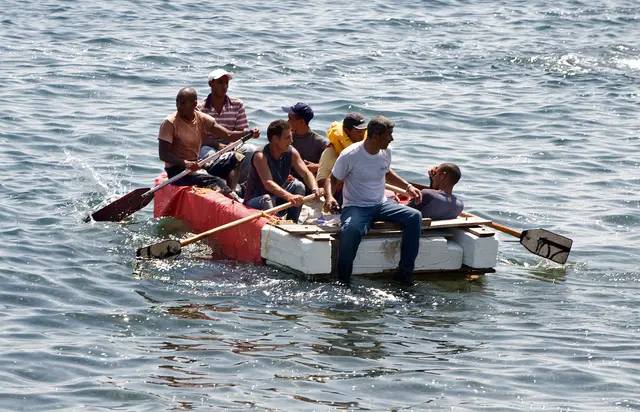The violent entry into Costa Rica Wednesday by at least 1,000 U.S.-bound Cuban migrants stranded in Panama has sparked condemnation from regional countries on the United States' Cuba policy.
Costa Rican Security Minister Gustavo Mata said the migrants stormed across the border and vandalized a vehicle before police brought the crowd under control. Panama shares a land border with Costa Rica.
Some of the migrants later crossed back into Panama, while others fled and would face deportation if found.
According to the Costa Rican official, some 150 police officers were deployed along the border and more reinforcements would be called in to control the area.
The migrants expect Costa Rican authorities to allow them to continue their north-bound journey to the United States, Panama's TV Noticias (TVN) news network reported.
Following several hours of protest, the Cuban migrants returned to the Panamanian province of Chiriqui, where they have been waiting for permission to travel northward, TVN said.
According to TVN, more than 2,300 Cuban migrants are still stranded in Panama, despite that some 1,500 Cubans moved on to Mexico more than a month ago.
Costa Rica's Foreign Ministry on Wednesday also published a statement over the "unlawful entry of migrants," slamming U.S. immigration policy toward Cuba and noting it had already processed more than 8,000 special transit visas for Cubans as part of a program concluded at the end of last year.
Costa Rica "denounces the diverse U.S. regulations that promote and grant privileges to enter that country, incite unlawful Cuban migration, and foster the conditions for human trafficking," the ministry said.
The Central American country "does not have the economic or logistical capacity" in continuing to accommodate an influx of migrants, the ministry said, adding that Costa Rica and Panama are "trapped in a region that keeps borders with the north closed and borders with the south open."
Costa Rican President Luis Guillermo Solis will write to his U.S. counterpart Barack Obama to express his country's condemnation of the U.S. immigration policy "that encourages migrants to continue a dangerous journey towards that country using our territories," the ministry said.
Since Cuba and the United States began talks to restore their diplomatic ties in late 2014, there has been a spike in illegal Cuban migration, driven by the fear that rapprochement between the two countries will end U.S. preferential policies toward Cubans who make their way to U.S. shores.
At a press conference, Costa Rican Foreign Minister Manuel Gonzalez also lashed out at the "outdated law that is still in force in the United States, in force since the Cold War -- and that has no reason to exist under the current circumstances of Cuba-U.S. ties."
On Tuesday, officials from nine countries along the migrants' route held a meeting in San Jose, but failed to reach an agreement on the migrants stranded in Panama.
Nicaragua, one of the countries along the route, closed its borders to Cuban migrants in November 2015, in a bid to force a solution to the issue.
"The situation should be resolved not by Central America but by the United States, since it is the one that has prompted many Cubans to try to get into it," Nicaraguan Deputy Foreign Minister Denis Moncada said in December.
The United States has not lifted the over-half-a-century sanctions on Cuba in spite of detente of ties. Enditem
 简体中文
简体中文

